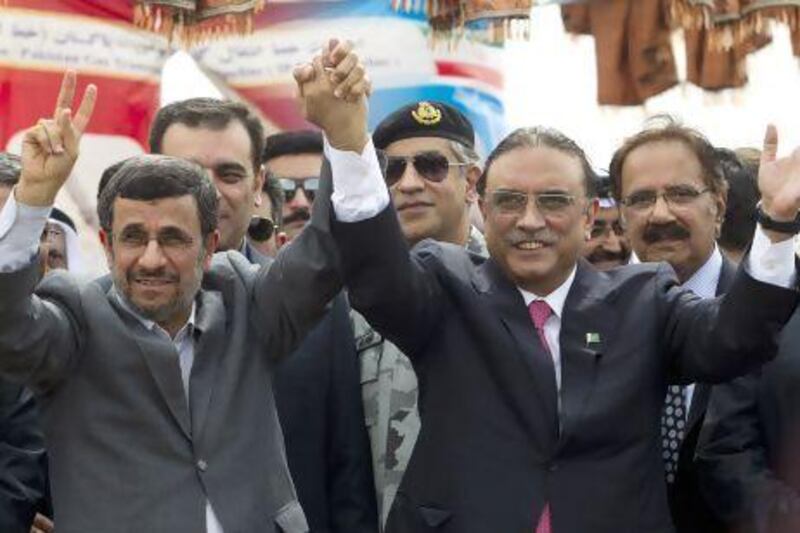GABD, Iran // The presidents of Pakistan and Iran inaugurated work yesterday on the cross-border leg of a much delayed gas pipeline that the US has warned may breach a sanctions regime aimed at curbing Tehran's nuclear programme.
The Iran-Pakistan pipeline is intended to help Pakistan overcome its mushrooming energy needs at a time when the country is facing increased blackouts and energy shortages.
But there are serious doubts about how Pakistan could finance the Dh5.51 billion needed to construct the pipeline and whether it could go through with the project without facing US sanctions, which Washington has put in place to pressure Iran over its nuclear programme.
In live television images shown on Pakistani TV, President Asif Ali Zardari and Iranian President Mahmoud Ahmadinejad shook hands with various dignitaries as the ceremony got under way at the border.
Monday's ceremony comes just days before the government's term is set to expire and could be designed to win votes by making the ruling Pakistan People's Party look like it's addressing the energy crisis. It also allows the government to thumb its nose at the United States, which is widely unpopular in Pakistan despite billions of dollars in military and civilian aid.
The US has opposed the project, instead promoting an alternative pipeline that runs from the gasfields of Turkmenistan to Afghanistan, Pakistan and then to India. The US has also championed a number of electricity-generation projects within Pakistan such as helping renovate hydropower dams.
Iran's deputy oil minister, Javad Owji, told Iranian state television that Tehran already built 900km of the pipeline, with about 320km remaining to be built inside Iran.
The Pakistan segment of the pipeline is expected to be about 780km. Mr Owji said Iranian contractors will be involved in building the Pakistani portion of the pipeline.
Gas is supposed to start flowing in by the end of 2014, although few see that deadline as realistic considering the delays so far in the project.
The US has repeatedly raised questions about the project.
"If this deal is finalised for a proposed Iran-Pakistan pipeline, it would raise serious concerns under our Iran Sanctions Act. We've made that absolutely clear to our Pakistani counterparts," said State Department spokeswoman Victoria Nuland during a press briefing in Washington last week.
Under American regulations, a wide-ranging list of business-related activities with Iran can trigger American sanctions. Certain sales of technology or equipment that allow Iran to develop its energy sector are barred, as are most transactions involving gasoline or other fuels, according to a January report by the Congressional Research Report. The regulations also bar business dealings with Iranian financial institutions.
Possible penalties include barring the entity violating the sanctions from receiving American military equipment or making it essentially impossible to do business with American banks.
Iran also faces separate European Union and UN sanctions over its nuclear programme, which the West believes is geared for building nuclear weapons. Tehran denies the charge, insisting the programme is for peaceful purposes.
Rhetoric aside, it remains to be seen whether Pakistan would ever actually face American sanctions. The PPP government led by Mr Zardari likely has only days left leading the country because new elections are expected to be called by the end of the week.
"That timing is very important for the People's Party because they are building their campaign on this," said Hussain Yasar, a senior energy analyst at KASB Securities in Karachi.
Speaking Monday morning before the president and his entourage left for Iran, a presidential spokesman said the project will have a huge economic impact on Pakistan.
"We hope our friends understand our energy needs," said Farhatullah Babar in a veiled reference to the US.





